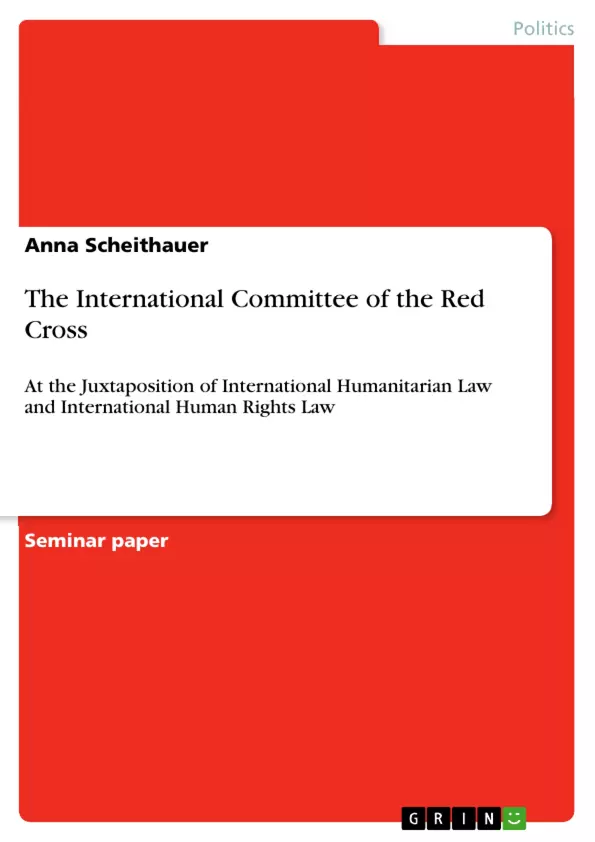Today, the International Committee of the Red Cross (ICRC) - unlike other humanitarian organizations - follows a principled application of the human rights based approach (HRBA). To gain insights into why the organization follows a HRBA at all and why it does so in a principled manner, I propose that this necessitates going back in history. I, thus, set out to explore the following research question in this paper: How have the concept and agenda of human rights “infiltrated” the ICRC with regards to its stance on and practices of humanitarian aid in the aftermath of the Second World War? I will, thereby, argue that examining the relationship between international humanitarian law (IHL) and international human rights law (IHRL) by diving into their drafting history in the aftermath of the Second World War will provide us with some valuable answers. Structurally, I will first discuss the HRBA and potential dilemmas raised for humanitarian actors. Secondly, I will provide an overview of the historical roots of humanitarianism and human rights as well as of the theoretical approaches on their legal relationship before diving into the drafting history of IHL and IHR to possibly evidence a mutually reinforcing relationship. I will illustrate this by showing how the experiences made by the ICRC during the Second World War and the Nigerian civil war shaped international legal development and with it also the practices and convictions of the organization.
Inhaltsverzeichnis (Table of Contents)
- Introduction
- The 21st Century: The Human Rights Based Approach
- Pitfalls for humanitarian actors
- The HRBA and the ICRC
- Back to the Roots: Humanitarianism and Human Rights
- A contested legal Relationship
- Post World War II: The Paradigm of Protection
- Preventing Atrocities in the Future
- The ICRC and Postwar Relief
- The Nigerian Civil War
- Legal Rapprochement
- Conclusion
Zielsetzung und Themenschwerpunkte (Objectives and Key Themes)
This seminar paper examines the integration of human rights into the International Committee of the Red Cross (ICRC) and its humanitarian practices after World War II. By analyzing the historical relationship between international humanitarian law (IHL) and international human rights law (IHRL) and the ICRC's operational experiences, the paper aims to understand how human rights concepts have influenced the ICRC's approach to humanitarian aid.
- The evolving relationship between international humanitarian law (IHL) and international human rights law (IHRL)
- The influence of human rights on the practices and convictions of the ICRC
- The ICRC's adoption of a human rights-based approach (HRBA) in humanitarian action
- The historical context of IHL and IHRL development, particularly in the aftermath of World War II
- The ICRC's role in promoting civilian protection and preventing atrocities
Zusammenfassung der Kapitel (Chapter Summaries)
The paper begins by discussing the human rights-based approach (HRBA) in the 21st century, highlighting its significance in development cooperation and its potential challenges for humanitarian actors. It then delves into the historical roots of humanitarianism and human rights, exploring their contested legal relationship. Chapter 4 focuses on the post-World War II period, examining the ICRC's role in postwar relief, the Nigerian Civil War, and the evolving legal framework that shaped the organization's practices.
Schlüsselwörter (Keywords)
The paper focuses on the intersection of international humanitarian law (IHL), international human rights law (IHRL), and the International Committee of the Red Cross (ICRC). It explores the human rights-based approach (HRBA) in humanitarian action, the historical development of IHL and IHRL, and the ICRC's experiences in armed conflicts such as the Nigerian Civil War. Other key concepts include civilian protection, prevention of atrocities, and the ICRC's principled application of the HRBA.
- Citar trabajo
- Anna Scheithauer (Autor), 2024, The International Committee of the Red Cross, Múnich, GRIN Verlag, https://www.grin.com/document/1452409



